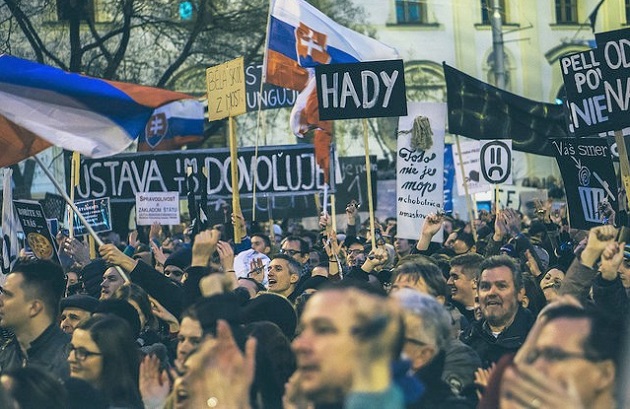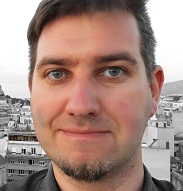“I believe that Christians have been called to shed light on what is wrong with the system”, says Slovak Christian worker Jaro Marcin.
 Protests for a better Slovakia in the streets of Bratislava, March 2018. / Matus Benian (Flickr, CC).
Protests for a better Slovakia in the streets of Bratislava, March 2018. / Matus Benian (Flickr, CC).
Tens of thousands took the streets last week in Bratislava and many other cities in what has been called a movement “for a decent Slovakia”.
The murder of an investigative journalist and his fiancée sparked protests across the country, which finally led to the fall of Prime Minister Robert Fico.
Citizens from all backgrounds demand more accountability and an end of corruption, says Jaro Marcin, a Slovak Christian worker.
Since yesterday, Slovakia has new Prime Minister, Peter Pellegrini, but many think not much will change.
Jaro Marcin told Evangelical Focus more details about the situation in Slovakia.
 Jaro Marcin.
Jaro Marcin. Question. Can you give us details about how the murder of the journalist has led to the resignation of the Prime Minister Fico?
A. Jan Kuciak, the journalist who was found murdered in his house with his fiancée several weeks ago, was working on a story that linked the Slovak government to Italian mafia in the east of Slovakia.
Apparently, an aide to the Prime Minister (by the name of Maria Troskova) used to be in an intimate as well as business relationship with an Italian businessman who was or is part of the mafia. This businessman has, from what has been said in the media, received funds from the EU through the Slovak government. The businessman, Antonio Vadala, has now been taken to custody. He and his close associates are being investigated by Slovak and Italian authorities, as far as my understanding goes.
This has not been the first scandal the Slovak government has been involved in in the last couple of years, but it is the one where people’s emotions really escalated because of the brutality of the murder of the investigative journalist.
Q. The protests last week have been the biggest in many years. What specific changes do people hope to see?
A. The protests have been under the slogan “for a decent Slovakia”. The organizers have been asking for a more civilized political culture, for accountability (political and criminal) of those who are suspected and convicted of corruption charges—and, of course, the murders of Kuciak and Kusnirova.
Last week, 65 thousand people gathered in Bratislava and thousands more in other towns and cities across Slovakia (and elsewhere in the world).
This week, a “new” government is going to officially take up office. The problem for many is that this is still government composed of the same parties. There have only been a few actual changes (including the Prime Minister) but the critics (like myself) claim this is not sufficient.
Q. As a Christian, why do you support this movement?
A. As a Christian, I think it is important to stand up for ethical values and political responsibility in our country and society. I believe that Christians have been called to help “right wrongs” and shed light on what is wrong with the system.
If our political system allows us to voice these rights publicly (as is the case in democratic countries), I think it is wise to make use of this liberty as long as we do it in a manner that is in itself ethically beyond reproof.
 Keys to protest against the government. / M. Benian (Flickr, CC)
Keys to protest against the government. / M. Benian (Flickr, CC)Q. Do most evangelical Christians in Slovakia engage in this social debate?
A. The protests seem to have united many people from all layers of society and a wide spectrum of religious beliefs. Since the plea is so basic as demanding “a decent Slovakia”, this appeal is something Christians and non-Christians alike can accept.
That being said, I now live in Prague so I do not see what is happening in Slovakia first-hand. However, Christians are among the voices being heard. Last week, for instance, at a protest rally in Levice, a smaller town in the west of Slovakia, Daniel Pastircak, a well-known Brethren Church pastor, addressed the crowd.
Q. How can other Christians in Europe pray for Slovakia?
A. I think it would be very helpful if Christians all over Europe could, first and foremost, pray for hope. In a post-Communist country like Slovakia (and many others are dealing with a lot of the same issues) many are skeptical that things can change.
Hope is at the heart of our Christian message. We want people to experience hope and see that things can be different.
I also think it important to pray for Christians in Slovakia—that in situations like these, we can be the “salt of the earth” and may continue to speak boldly, but wisely, always seeking God’s guidance and council.
ABOUT JARO MARCIN
Jaro Marcin works for the Eastern European Mission, a Christian non-profit that distributes Bibles across the post-Communist countries. Previously, he taught English and Drama at a Lutheran High School and later American Studies at the university in Kosice (Slovakia), his hometown.
The views expressed in this interview are personal and do not represent the organisation Marcin works with.

Las opiniones vertidas por nuestros colaboradores se realizan a nivel personal, pudiendo coincidir o no con la postura de la dirección de Protestante Digital.
Si quieres comentar o